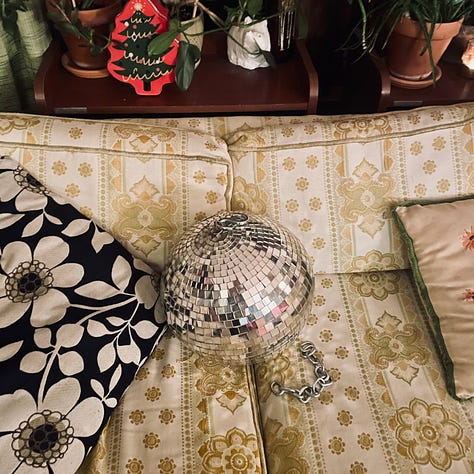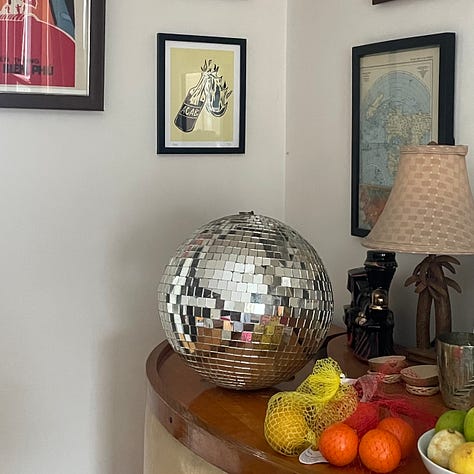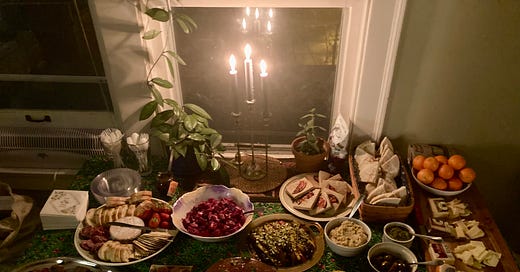I woke up this morning with a full heart. We hosted a party for the first time since our wedding, back in August 2022 — and a New Year’s Eve celebration for the first time since the winter my dad passed away. Different friend groups met and mingled; worlds expanded. We spent the evening eating a group-created buffet: corn cakes and cookies, beet salad and roasted carrots and fennel-white bean dip, spreads of cheeses and jams, Champagne jelly and macarons, marinated herring at midnight.
We talked about the milestones and shapes that our lives have taken this year: marriages, babies, home projects, things that define our everyday existences. It was a party that I think would be best described as cozy. When we weren’t comfortably nestled into couch corners, we were relaxed in the kitchen, grazing on food; either way, we were, in multiple senses, at home with each other. Standing at the kitchen counter, four of us eating marinated herring straight out of the Ma Baensch jar, we connected over something only our fathers partook in over the winter holidays (our picky, fearful childhood palates stayed away from the strange jarred fish), and we savored it.



I’ve seen a sentiment floating around social media over the last few weeks — as genocides rage on to serve the invasive ideals of settler-colonists and the extractive ideals of capitalists and as these evils seem to become increasingly flagrant — scolding Americans for celebrating the new year while our government bolsters Israel’s decimation of a place and extermination of a people. I try to remind myself that this is the genre of post that keeps the Internet running, existing as a hot reaction to be interacted with through more hot reactions. I sympathize with the sentiment, though, since I, too, deeply hate and am deeply disturbed by my country’s actions, by my country’s ethos. Rhetoric like this gives me pause, forces me to think about how much we really can do to resist and agitate for better policies, for better lives at home and abroad. Often, it feels like we live surrounded by grief: collective grief driven by mass loss and destruction by things like racism and Covid-19; climate grief, as we lose coastlines, seasons, all forms of flora and fauna; the grief associated with the abundant clarity that our society isn’t so democratic after all; we all likely hold some personal grief, too, and maybe these other forms of grief amplify it. Should we not gather for age-old rituals, or find joy from spending time with the people we love?*
The feeling of deep satisfaction, of love, of joy, that I woke up with had everything to do with sharing my home with friends. It’s a seemingly small act with poignant measures that combat how isolated our lives can become — and how isolating our society tries to construct them to be. As people arrived earlier in the evening and then departed after midnight, they thanked us, expressing gratitude and love in words and hugs. Of course, it’s our pleasure, I would reply, my Catholic-raised Midwestern tongue afraid of the shape my mouth would take to say you’re welcome. But I think both turns of phrase ring true: welcoming friends into the home is a pleasure.
What kept my feeling of good cheer running into the morning had so much to do with our party’s democratic spirit. Though we hosted, our table was overflowing with our friends’ generous contributions. A friend who stayed the night eased the initial round of cleaning up at 1:00 in the morning, a task made joyful by drinking remnants of punch and Cava and dancing to Talking Heads and New Order while we washed dishes and put away food.
Marosia Castaldi’s prose-poem of a novel, The Hunger of Women, follows Rosa, a widow beginning to navigate her life as her daughter matures and prepares to leave her home. Rosa finds new meaning through making food that she grew to know through her mother’s cooking, and her mother’s mother’s cooking (and so on) during her childhood in Naples, and opens a trattoria in her Lombardy home. The restaurant is a spiritual site: to Rosa, cooking is a God-like art; it’s also an opportunity for her to connect with others, forming intimate friendships that are nourishing, caring, and romantic. She writes, “Life is ferment battle struggle joy torment It’s never still It is a glorious eternal churning movement in which we were absorbed and celebrated along with our sacred repasts”.
A key component of Jacques Rancière’s political philosophy is rooted in the distribution of the senses: how are our politics shaped by how each of us touches, sees, hears, tastes, smells? Sensability (centering the senses) and sensuality are at the heart of Rosa’s navigation of the world: we see this in the lavish dishes that she prepares for her trattoria, in how she cares for her friends and neighbors, and in how she treats her lovers. By the end of the book, she’s clear in her wish to bring us, the readers, along with her to pursue a life of joy and pleasure, to build new ways of living with her. Life’s challenges and pains are not lost on her: they are the encouragement to care for others and to resist falling into a trap of isolation.
Rosa’s meals — the descriptions for which sometimes span whole pages — connote a sense of wonder and ecstasy that Henri Lefebvre writes about in Critique of Everyday Life: “The mysterious, the sacred and the diabolical, magic, ritual, the mystical — at first all of these were lived with intensity. They were part of the real lives of human beings — thoroughly authentic, affective and passionate forces. Then, with the appearance and development of rationality, they were doubly modified, along with their relationship to everyday life.” When life’s demands don’t slow, and the powerful continue to push on, how can we reincorporate some of the magic and awe that Lefebvre laments? Rosa’s trattoria seeks to do just that, I think. In doing so, she reimagines networks of care, support, and love.
I feel the importance of incorporating joy and wonder into our lives now more than ever. It feels like a resistance to the ways that our society pushes us to be ever-more transactional in our relationships, a society that is desensitizing us to pandemics and genocides. We can’t ignore the world’s grimness, but who’s to say that something radical can’t come out of moments of joy and pleasure with our loved ones?
*Alicia Kennedy wrote a beautiful essay about the intersections of joy and grief, “Both Joyful and Killjoy”. Instead of my saying more on this vast topic, I’ll just encourage you to read what she wrote.





What else is there (joy)? Beautifully written. Happy New Year!
I loved this, Clare. So much resonated so strongly, particularly this sentiment: "Life’s challenges and pains are not lost on her: they are the encouragement to care for others and to resist falling into a trap of isolation.". To try our best to not allow the sad and difficult parts of life to harden us; to refuse to give in to "what's the point"; to resist becoming selfish and insular, cynical and inward-focussed; to keep reminding ourselves that the only way to survive the hardships that befall us, the fear and sadness in the world, is to love, and let ourselves be loved.
I hadn't heard of "The Hunger of Women", but it sounds made for me and I can't wait to seek it out. From Naples to Lombardy (same as my family), and pages of descriptions of food and meals: what more could I want from a book!